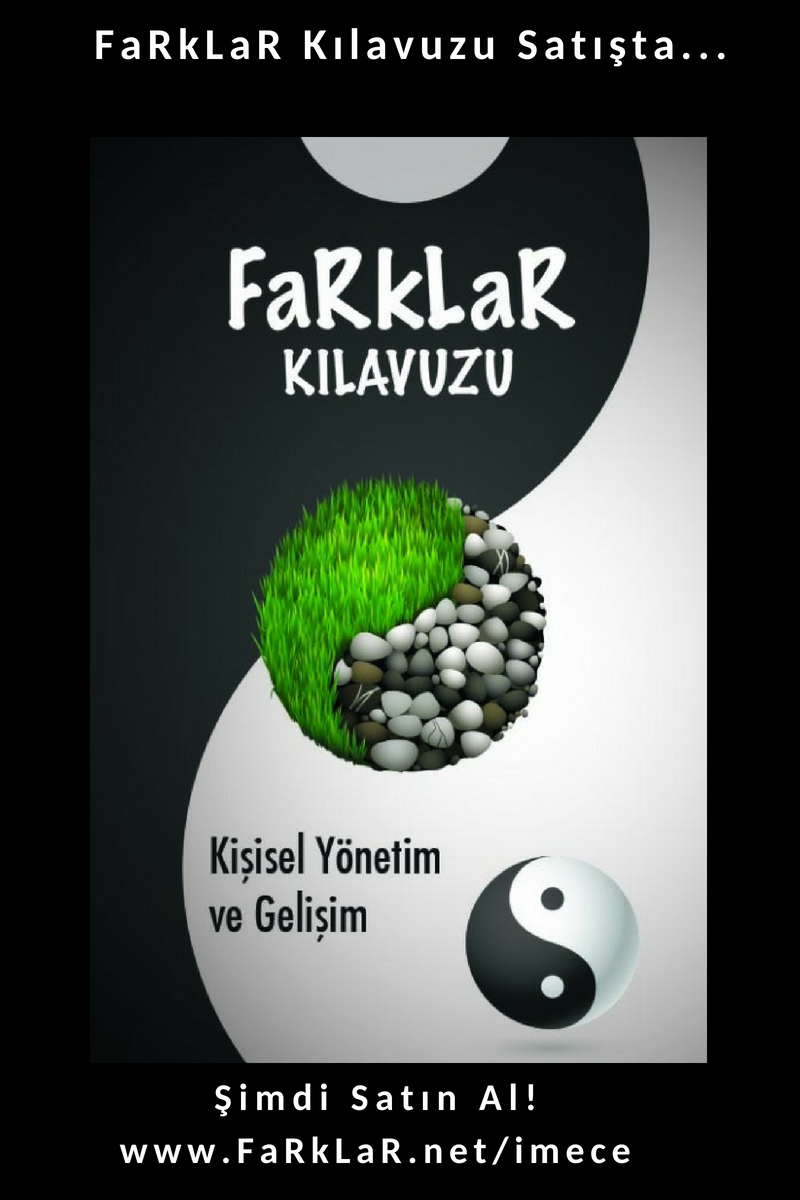Bağlaçlar ve İlişkiler
Diller
Hızlı Erişim
İlgilendiğiniz konulara göre FaRkLaR'ı keşfedebilirsiniz. Bağlaçlar ile sözcükler arasındaki ilişkileri inceleyebilirsiniz...
KORKU ile/ve/değil/||/<>/> KAYGI
Sözcük Ağacı Görünümü
Sözcükler:
KORKU
KAYGI
Bağlaç Açıklamaları:
İle
Ve
Değil
Yerine
Paralel
›‹
Karşıt
← İçe
→ Dışa
Veya
( KAYNAK: Korkunun kaynağını biliriz, ancak kaygının kaynağı belirsizdir.
SÜRE: Korku, daha kısa sürelidir, kaygı ise uzun süre devam eder.
ŞİDDET: Korku, kaygıdan daha şiddetlidir. )
SÜRE: Korku, daha kısa sürelidir, kaygı ise uzun süre devam eder.
ŞİDDET: Korku, kaygıdan daha şiddetlidir. )
FaRkLaR Kılavuzu 12.03.2012 [00:37]
( Beyinde. [amigdala'da]. İLE/VE/DEĞİL/||/<>/> Zihinde.["bağlarda"] )
FaRkLaR Kılavuzu 12.03.2012 [00:37]
( [kaynağı] Dışarıda. İLE/VE/DEĞİL/||/<>/> İçeride. )
FaRkLaR Kılavuzu 12.03.2012 [00:37]
( Dışarıdan içeriye. İLE/VE/DEĞİL/||/<>/> İçeriden dışarıya. )
FaRkLaR Kılavuzu 12.03.2012 [00:37]
( Varoluşsal, zorunlu, geçerli, gerekli, etkili ve yetkin. İLE Anlamsız, değersiz, geçersiz, gereksiz, etkisiz ve yetkisiz. )
FaRkLaR Kılavuzu 12.03.2012 [00:37]
( Köpek/arı korkusu (yakındaysa/yakınlaşıyorsa)
"Köpek/arı kaygısı" (uzaktaysa/yakınlaşmasa da)
Uçak korkusu (binmeye yaklaştıkça)
"Uçak kaygısı" (binmeden ve düşmesi "düşüncesiyle")
Terk edilme korkusu (ondan daha önce terk edememe düşüncesiyle)
"Terk edilme kaygısı" (bitmeye yaklaştıkça)
[Deneyimleneceklerde, elde etmede, sınırlarda ve sınavlarda...]
Başaramama korkusu (zihnindeki ve "kendince" sınırsız "çözümleriyle")
"Başaramama kaygısı" (çıkarlarının kaybedilecek olması ya da çatışmasıyla)
[Varoluş sürecinde ve gereksiniminde...]
"Ben olamama" korkusu (ötekilerin "gücü" ya da "üstünlüğüyle")
"Ben olamama" kaygısı (aidiyet sağlayamamayla) )
"Köpek/arı kaygısı" (uzaktaysa/yakınlaşmasa da)
Uçak korkusu (binmeye yaklaştıkça)
"Uçak kaygısı" (binmeden ve düşmesi "düşüncesiyle")
Terk edilme korkusu (ondan daha önce terk edememe düşüncesiyle)
"Terk edilme kaygısı" (bitmeye yaklaştıkça)
[Deneyimleneceklerde, elde etmede, sınırlarda ve sınavlarda...]
Başaramama korkusu (zihnindeki ve "kendince" sınırsız "çözümleriyle")
"Başaramama kaygısı" (çıkarlarının kaybedilecek olması ya da çatışmasıyla)
[Varoluş sürecinde ve gereksiniminde...]
"Ben olamama" korkusu (ötekilerin "gücü" ya da "üstünlüğüyle")
"Ben olamama" kaygısı (aidiyet sağlayamamayla) )
FaRkLaR Kılavuzu 12.03.2012 [00:37]
( Korkunun bir bölümü, varolanlara bir zarar düşünmediğimiz zaman gider. )
FaRkLaR Kılavuzu 12.03.2012 [00:37]
( İhanetten uzak kaldığın kadar korkmazsın. )
FaRkLaR Kılavuzu 12.03.2012 [00:37]
( Zan gitmedikçe, korkudan ve kaygıdan kurtulamayız. )
FaRkLaR Kılavuzu 12.03.2012 [00:37]
( Gövde ve zihin sınırlılardır, onun için de incinmeye açıklardır, onların, korunmaya gereksinimleri vardır ve bu da korkuya yol açar. )
FaRkLaR Kılavuzu 12.03.2012 [00:37]
( Gelecek için antrenman, tutumlar geliştirme; bunlar korku işaretidir. )
FaRkLaR Kılavuzu 12.03.2012 [00:37]
( Acı çekmemiş olan, korkmaz. )
FaRkLaR Kılavuzu 12.03.2012 [00:37]
( İç ve dış arasındaki ayrımın yalnızca zihinde olduğunu idrak ettiğiniz zaman, artık korkunuz kalmaz. )
FaRkLaR Kılavuzu 12.03.2012 [00:37]
( Arzulardan ve korkulardan kurtulun, görüşünüz birdenbire berraklaşacak ve herşeyi olduğu gibi göreceksiniz. )
FaRkLaR Kılavuzu 12.03.2012 [00:37]
( İç değerinizi bilmelisiniz, ona güvenmelisiniz ve günlük yaşantınızda arzu ve korkularınızı feda ederek bunu belirgin kılmalısınız. )
FaRkLaR Kılavuzu 12.03.2012 [00:37]
( Arzudan ve korkudan kurtulmak bizi öyle korkutmasın. Bu hepimizin bildiğinden öyle farklı, çok daha yoğun ve ilginç bir yaşam sürdürebilmemizi sağlayacaktır. Öyle ki biz her şeyi kaybetmekle gerçekten her şeyi kazanmış oluruz. )
FaRkLaR Kılavuzu 12.03.2012 [00:37]
( Once you realise that all comes from within, that the world in which you live has not been projected onto you but by you, your fear comes to an end.
You are love itself - when you are not afraid.
An understanding mind is free of desires and fears.
The more you know yourself the less you are afraid.
Discover your mistake and be free of fear.
The body and the mind are limited and therefore vulnerable; they need protection which gives rise to fear.
Training for the future, developing attitudes is a sign of fear.
Who has not suffered is not afraid.
When you realise that the distinction between inner and outer is in the mind only, you are no longer afraid.
Be free of desires and fears and at once your vision will clear and you shall see all things as they are.
You must know your inner worth and trust it and express it in the daily sacrifice of desire and fear.
Do not be afraid of freedom from desire and fear. It enables you to live a life so different from all you know, so much more intense and interesting, that, truly, by losing all you gain all. )
You are love itself - when you are not afraid.
An understanding mind is free of desires and fears.
The more you know yourself the less you are afraid.
Discover your mistake and be free of fear.
The body and the mind are limited and therefore vulnerable; they need protection which gives rise to fear.
Training for the future, developing attitudes is a sign of fear.
Who has not suffered is not afraid.
When you realise that the distinction between inner and outer is in the mind only, you are no longer afraid.
Be free of desires and fears and at once your vision will clear and you shall see all things as they are.
You must know your inner worth and trust it and express it in the daily sacrifice of desire and fear.
Do not be afraid of freedom from desire and fear. It enables you to live a life so different from all you know, so much more intense and interesting, that, truly, by losing all you gain all. )
FaRkLaR Kılavuzu 30.06.2014 [20:04]
( FEAR: [not] Forget Everything And Run VS./AND/||/<>/>/BUT Face Everything And Rise
Face Everything And Rise INSTEAD OF Forget Everything And Run )
Face Everything And Rise INSTEAD OF Forget Everything And Run )
FaRkLaR Kılavuzu 17.04.2015 [04:05]
( Bir kez, her şeyin içten geldiğini, içinde yaşadığınız dünyanın size değil, sizin tarafınızdan yansıtıldığını idrak ettiğinizde, korkularınız sona erer. )
FaRkLaR Kılavuzu 13.06.2016 [03:20]
( Biz, sevgiyiz.[korkmadığımızda] )
FaRkLaR Kılavuzu 22.06.2016 [19:10]
( Anlayan bir zihin, arzulardan ve korkulardan azâdedir. )
FaRkLaR Kılavuzu 22.06.2016 [19:12]
( Korku, bilmemekten ileri gelir. )
FaRkLaR Kılavuzu 22.06.2016 [19:13]
( Kendimizi ne kadar daha çok bilirsek, o kadar daha az kaygılanırız. )
FaRkLaR Kılavuzu 22.06.2016 [19:19]
( Hatanızı keşfedin ve korkudan kurtulun. )
FaRkLaR Kılavuzu 22.06.2016 [19:21]
( Gövdemizin sahibi olursak, korkuyu atarız. )
FaRkLaR Kılavuzu 12.03.2012 [00:37]
( Varolan bir şeyden çekinme. İLE/VE/DEĞİL/||/<>/> Henüz gerçekleşmemiş bir şeyden çekinme. )
FaRkLaR Kılavuzu 12.12.2018 [01:42]
( )
FaRkLaR Kılavuzu 28.02.2021 [19:38]
( [CHAT GPT >]
Korku ve kaygı, genellikle birbiriyle karıştırılan, yakından ilişkili duygulardır ancak bunlar farklı deneyimlerdir.
Korku, algılanan bir tehdide tepki olarak yaşanan doğal, sağlıklı bir duygudur. Bizi zarardan korumaya yardımcı olan tehlikeye karşı doğal bir tepkidir. Korku, genellikle kısa ömürlüdür ve bulunduğunuz koşullarda belirli bir uyarana tepki olarak ortaya çıkar.
Kaygı ise sinirlilik ve huzursuzluk ile tanımlanan daha uzun süreli bir düşünce zinciridir. Kaygı, genellikle şu andaki belirli bir uyaran yerine gelecekteki olayların ya da kaygıların beklentisiyle tetiklenir. Acil bir tehlike olmadığında bile zamanla devam eden kronik bir durum olabilir.
Genel olarak korku, belirli bir tehdide ya da tehlikeye verilen bir yanıtken; kaygı, gelecekteki tehdit ya da tehlike olasılığına bir yanıttır. İki duygu da bizi harekete geçmeye ve kendimizi korumaya güdüleyebildiğinden ancak belirli durumlarda yardımcı olabilir. Ancak korku ya da kaygı kronikleştiğinde ya da aşırı duruma geldiğinde, zihinsel ve fiziksel sağlığımız üzerinde olumsuz etkileri olabilir.
[English]
Fear and anxiety are closely related emotions that are often confused with one another, but they are distinct experiences.
Fear is a natural, healthy emotion that is experienced in response to a perceived threat. It is a natural response to danger that helps to protect us from harm. Fear is generally short-lived and occurs in the present moment, in response to a specific stimulus.
Anxiety, on the other hand, is a more prolonged emotion that is characterized by feelings of worry, nervousness, and unease. Anxiety is often triggered by anticipation of future events or concerns, rather than by a specific stimulus in the present moment. It can be a chronic condition that persists over time, even when there is no immediate danger present.
In general, fear is a response to a specific threat or danger, while anxiety is a response to the possibility of future threats or dangers. Both emotions can be helpful in certain situations, as they can motivate us to take action and protect ourselves. However, when fear or anxiety becomes chronic or excessive, it can have negative effects on our mental and physical health. )
Korku ve kaygı, genellikle birbiriyle karıştırılan, yakından ilişkili duygulardır ancak bunlar farklı deneyimlerdir.
Korku, algılanan bir tehdide tepki olarak yaşanan doğal, sağlıklı bir duygudur. Bizi zarardan korumaya yardımcı olan tehlikeye karşı doğal bir tepkidir. Korku, genellikle kısa ömürlüdür ve bulunduğunuz koşullarda belirli bir uyarana tepki olarak ortaya çıkar.
Kaygı ise sinirlilik ve huzursuzluk ile tanımlanan daha uzun süreli bir düşünce zinciridir. Kaygı, genellikle şu andaki belirli bir uyaran yerine gelecekteki olayların ya da kaygıların beklentisiyle tetiklenir. Acil bir tehlike olmadığında bile zamanla devam eden kronik bir durum olabilir.
Genel olarak korku, belirli bir tehdide ya da tehlikeye verilen bir yanıtken; kaygı, gelecekteki tehdit ya da tehlike olasılığına bir yanıttır. İki duygu da bizi harekete geçmeye ve kendimizi korumaya güdüleyebildiğinden ancak belirli durumlarda yardımcı olabilir. Ancak korku ya da kaygı kronikleştiğinde ya da aşırı duruma geldiğinde, zihinsel ve fiziksel sağlığımız üzerinde olumsuz etkileri olabilir.
[English]
Fear and anxiety are closely related emotions that are often confused with one another, but they are distinct experiences.
Fear is a natural, healthy emotion that is experienced in response to a perceived threat. It is a natural response to danger that helps to protect us from harm. Fear is generally short-lived and occurs in the present moment, in response to a specific stimulus.
Anxiety, on the other hand, is a more prolonged emotion that is characterized by feelings of worry, nervousness, and unease. Anxiety is often triggered by anticipation of future events or concerns, rather than by a specific stimulus in the present moment. It can be a chronic condition that persists over time, even when there is no immediate danger present.
In general, fear is a response to a specific threat or danger, while anxiety is a response to the possibility of future threats or dangers. Both emotions can be helpful in certain situations, as they can motivate us to take action and protect ourselves. However, when fear or anxiety becomes chronic or excessive, it can have negative effects on our mental and physical health. )
FaRkLaR Kılavuzu 23.12.2022 [13:48]
( REV', REV'A, HAVF ile/ve/değil/||/<>/> GAMM )
( BÂK, PERVÂ ile/ve/değil/||/<>/> ENDİŞE[< Pehlevice/Farsça]: Düşünüyorum] )
( [not] FEAR vs./and/||/<>/>/but ANXIETY/CONCERN )
( METUS cum//et/./||/<>/> ... )
İlişkili Başlıklar Haritası
- KUŞKU~KAYGI
-
ADEM
|------VEHM------|ŞEKK|------ZANN/ŞÜPHE------|
~
YAKÎN - HÜZÜN VE ÜZÜNTÜ~ÜMİT VE KAYGI
- DİNİ İNANÇ~"DİNİ KAYGI"
- MUTSUZLUK MERKEZLERİ~MUTLULUK MERKEZLERİ
- KAYGI~KURUNTU
- KAYGI~İŞKİLLENMEK/VESVESE[Ar.]
- KAYGI~TEDİRGİNLİK/PERTÜRBASYON
- KAYGI~TELAŞ/LANMA
- KAYGI~DUYARLILIK
- KAYGI/ENDİŞE[Fars. :Düşünce.]~ÇEKİNME/ÇEKİNCE
- KAYGI~TUTUM
- MELANKOLİ~KARAKAYGI
- FELSEFÎ KAYGI~FELSEFÎ YAKLAŞIM
- ACIMAK~KAYGILANMAK
- TEPKİSİZLİK~HAZIR-YANITLI OLAMAMA KAYGISI
- İŞE/ÇALIŞMAYA BAŞLAYAMAMAK~İŞİN/ÇALIŞMANIN BÖLÜNMESİ/KESİLMESİ KAYGISI
- BİRİNCİL OLAN~İKİNCİL OLAN
- AMAÇ~ARAÇ
- TEMEL~SÜREÇ~(")SONUÇ(")
- KURAM/TEORİ~UYGULAMA/PRATİK
- GENEL~ÖZEL
- KAYGI~SAYGI
- ADÂLET~KAYGISIZLIK
- KAYGI~ÜRPERTİ
- DÜŞME KAYGISI~YÜKSEK SES KAYGISI
-
GEÇMİŞ ODAKLILIK[RUMİNASYON]:
TAKINTILI~BUNALIMLI/ÇÖKÜNTÜLÜ



